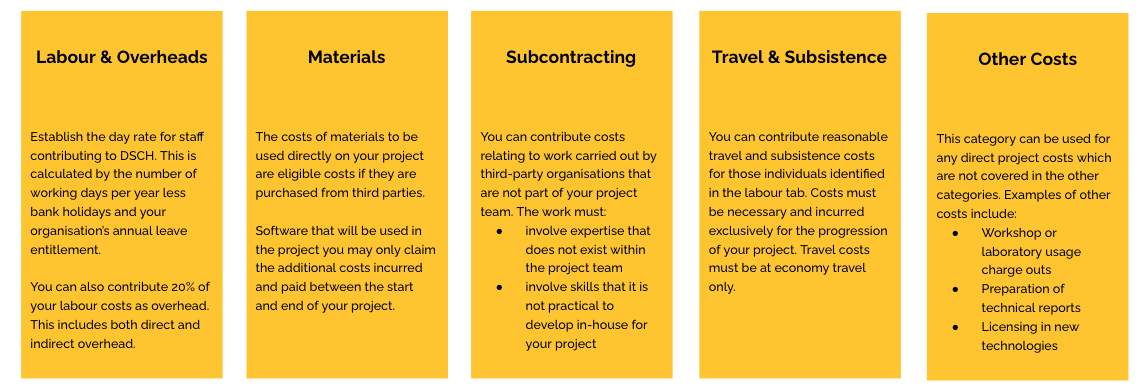Testbed Challenge Areas
-
Challenge Area 1 – Food Testbed: Enhancing ESG measurements and metrics
Aim: To develop a robust system that can create accuracy and transparency around ESG reporting in food supply chains, starting with fruit.
Background
The food test bed developed by Contained Technologies UK Ltd (Contained.io) in conjunction with its broad consortium of academics & industry partners is a high-utility low accessible set of tools critical to the improvement of fresh produce supply chains from seed to shelf in commercial and environmental metrics. The system brings essential reporting requirements of the industries involved in the production, import & export of perishable goods into a manageable framework offering optimisation using both bleeding edge & known, reliable technologies to make real world difference to users
Challenge Description
We are looking for technology providers focused around ESG compliance within food supply chains. Ideal applicants will come with digital solutions that can complement our goal of creating a robust system that can create accuracy and transparency around ESG reporting in food supply chains, starting with fruit.
The final system should provide data in a form compatible with ESG regulatory reporting requirements as well as bring in work commissioned by the DEFRA Science team. This system will leverage multiple data sources, processed through the Food Test Bed platform, utilising AI tools to provide precise analysis of ESG data. This initiative aligns with the UK’s commitment to promoting sustainable practices in agriculture and logistics.
Data collection and integration:
- Data sources: we will gather data through CSV files and APIs covering key data points such as field location, farming practices, energy consumption, harvesting methods, transportation mode, and more.
- ETL platform – testbed: testbed will serve as our extract, transform, load (ETL) platform, ensuring efficient data integration, cleaning, and preparation.
For more information:
- Website: https://9ai.harvestlab.net/
- Get in touch: opencall@contained.io
-
Challenge Area 2 – Hydrogen Testbed: Scaling adoption for off-grid sites
Aim: To scale hydrogen adoption, especially in the non-road mobile machinery space, which will in turn significantly accelerate the growth of the UK hydrogen market.
Background
Hydrologiq is working to develop a testbed in the emerging hydrogen supply chain. The aims of the testbed are to enable collaboration between supply chain and end customers by managing disparate data in a central, transparent and extensible platform. This will improve sustainability by allowing processes to be modelled and impact to be assessed, drive down costs through demand aggregation and build better supply chain resilience.
Challenge Description
Beyond the initial operational challenges, the adoption of hydrogen on off-grid sites can be hampered by the lack of data and insights required for scaling. With its rich, multi-tier supply chain data, the hydrogen testbed can help 3rd parties assess their scaling options, taking into account the availability and the ease of transport of hydrogen across the UK.
We would like to invite any 3rd parties with the ambition to scale their hydrogen adoption, especially in the non-road mobile machinery space, to work with us to address this challenge, which will in turn significantly accelerate the growth of the UK hydrogen market.
For more information:
- Website: https://www.hydrologiq.com/api-platform/#testbed
- Get in touch: platform@hydrologiq.com
- Terms & Conditions: https://www.hydrologiq.com/testbed-terms-of-use/
-
Challenge Area 3 – Spares Testbed: Implementing standardised labelling for spare parts
Aim: To implement a standard framework supported by AI, transforming legacy records into a uniform format for seamless part identification throughout the automotive supply chain.
Background
NBT group is leading a consortium to create a testbed environment for modeling spare parts supply chains and testing new technology solutions to improve sustainability and performance. The testbed will support the development of a digital twin of a spare parts supply chain for any interested party. NBT’s 2021 Innovate UK funded Feasibility Study revealing 90%+ of all emissions are Scope 3 within an organisation’s supply chain.
This testbed will allow for modeling collaboration to improve sustainability, circular economy practices, and the impacts of new technologies like additive manufacturing.
Challenge Description
Inconsistent identification and labelling standards present a significant challenge across supply chains, including automotive, amplifying supply and demand risks and reducing efficiency, productivity, and lead times.
This is remedied by implementing a standard framework supported by AI, transforming legacy records into a uniform format for seamless part identification throughout the automotive supply chain. This standardisation streamlines processes, mitigates risks, and boosts efficiency and productivity.
For more information:
- Get in touch: Obiye Ada-Ibrama at o.ada-ibrama@northumbria.ac.uk, Dr. Alireza Shokri at alireza.shokri@northumbria.ac.uk or Toby Bridges at toby.bridges@nbtgroup.co.uk




